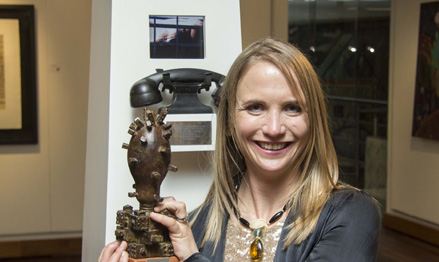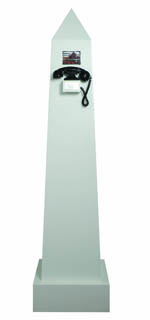|
 |
|
Pauline Gutter, winner of this year’s Absa L’Atelier competition
Photo: Supplied
23 July 2013 |
"Dagbreek: Die Dagbreker" - interview with Pauline Gutter (YouTube)
A former Kovsie won the Absa L’Atelier competition – South Africa’s most prestigious art competition – for the second year in a row. 
Pauline Gutter, who completed her BA Fine Arts degree at the UFS in 2003, is the second artist from the Free State to win the competition, which is in its 28th year of existence. In 2012, Elrie Joubert, another former Kovsie student from the Department of Fine Arts, won the competition as well.
As overall winner, Gutter receives a cash prize of R125 000 and six months’ residency in the studio apartment Cité Internationale des Arts in Paris, France.
Her winning entry, Die huweliksaansoek, is an interactive work consisting of a 1.8 m high association-rich obelisk, an engraved plaque, a small TV monitor and a farm-line handset. A video of a bull standing in a crush while semen is being drawn from it, is displayed. The viewer is invited to listen in voyeuristically. The soundtrack for the text is composed of statements and comments made by participants in the programme “Boer soek `n Vrou”. The question highlighted by the work, is, “does a farmer choose his future wife in the same way he breeds his stud animals?”
Pauline says her association with the farm, principled parents and strong family ties serve as inspiration for her work. To express her artistic voice in a contemporary environment is to be a close observer of society, she says. “It’s to ask questions which confront the viewer in a provocative way.”
Her advice to new artists is “hard work, sustainability and commitment. Keep looking until you find the place where you fit in.”